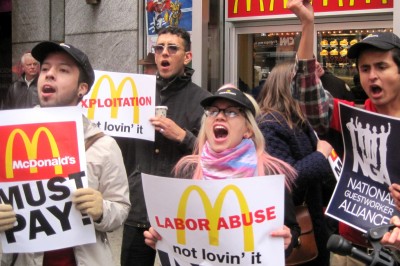Fast Food Forward is leading restaurant and retail store workers to strike for higher wages and increased work hours. Fast food workers in some major American cities are asking for more than double the current minimum wage. A little bit of common sense infused into the big pay jump request would alert entry level workers to the realization that such salary hikes would mean layoffs and price increases. The “I want it and give it to me now” culture evolving in the United States is undoubtedly bolstered by liberals and union leaders.
Flipping burgers at McDonalds or ringing up over-priced panties at Victoria’s Secret are not highly skilled jobs. Such entry level positions were once coveted by high school students and college kids. The minimum wage paychecks enabled the youngsters to buy their first car and pay for college text books. Not surprisingly, the SEIU is supporting the strike efforts by fast food and retail employees.
SEIU President Mary Lou Henry had this to say about the Fast Food Forward strike:
“SEIU members, like all service-sector workers, are worse off when large fast-food and retail companies are able to hold down wages and push down benefit standards for working people.”
Front line workers at food and retail chains cannot expect to earn more than minimum wage unless they garner work experience and training to advance to managerial positions. The young people of America today want to earn fat paychecks for entry level positions and a salary for internship opportunities. Exactly how the expectation of earning a salary similar to an accomplished professional right off the bat evolved is baffling to ponder. Maybe the unreasonable desire began when every child was handed a trophy and parents started giving non-occasion gifts instead of time to their children.
Workers at McDonalds, Burger King, Wendy’s, Dollar General, Victoria’s Secret, and Kentucky Fried Chicken walked off their jobs July 29 in at least seven major metropolitan areas. If I owned or managed one of the chains and an employee simply opted out of work, their final paycheck would be mailed to them immediately.
Earlier this spring, the SEIU supported another fast food protest. Instead of going to work and engaging in activities which would have led to a paycheck commiserate with the task, employees spent the day on Twitter trying to make the #fastfoodfwd hashtag go viral. The slogan on Fast Food Forward’s Twitter account says, “No one can survive on $7.25.” The size of the paycheck needed to survive depends on both where a worker lives and how thrifty they are with their spending habits.
New Manual Gives College Students A Huge Advantage Over Their Peers
Fast Food Forward Director Jonathan Westin had this to say during a CBS New York interview:
“A lot of the workers are living in poverty, you know, not being able to afford to put food on the table or take the train to work. The workers are striking over the fact that they can’t continue to maintain their families on the wages they’re being paid in the fast-food industry.”
The vast majority of fast food and retail workers are young people hired solely as part-time employees. The less than full-time employment gives employees, both young and middle aged, the time to take college or vocational training classes to ultimately earn a higher wage once more advanced academic or technical skills have been achieved. Robert Wilson Jr., a Chicago McDonald’s employee told the Washington Post that he makes $8.60 per hour and is not concerned about losing his job during the Fast Food Forward one-day strikes.
The Chicago McDonald’s worker also noted during the interview that he had been with the company for seven years and he is 25-years-old. He did not state whether or not he was a college student working part-time or if he had taken any type of training to better himself and his job prospects during the seven years. According to the National Employment Law Project, less than 50 percent of fast food restaurant jobs are in managerial positions.
It would be extremely difficult for two minimum wage workers to raise a family on such meager paychecks. I feel the matter boils down to an issue of personal responsibility. Fast food and retail paychecks are reasonable for the skills needed to do the job. Such entry level positions are just fine for teens and college students. As previously reported by Off The Grid News, Walmart may stop work on three stores already under construction if a Washington, D.C. “living wage” or super minimum wage directed at large retail stores, becomes law.
Not everyone is college material, and that’s okay. A part-time McDonald’s employee who does not feel the academic realm is a good fit can always learn a skilled trade and garner a greatly enhanced salary. The world needs plumbers, construction workers, electricians, hair dressers, tractor-trailer drivers, and roofers too. The youth of America have sadly turned up their collective noses at work which involves getting their hands dirty. Our local electrician does not hold a college degree, but he took training specific to his career field and takes great pride in his work. When we have a problem and give him a call, we know without a doubt that the issue will be fixed both promptly and accurately.
Workers do not have to hold a bachelor’s degree and sit in an office to become successful or earn a living wage. Employees have to pay their dues and learn new skills in order to advance in their career, regardless of the chosen field or industry. The United States is unfortunately no longer a leader in manufacturing and the bulk of the careers expected to flourish in the coming years are service oriented. Instead of thinking “woe is me, I want more money for working a drive-thru window,” fast food and retail workers should be taking advantage of financial aid programs which allow low-income Americans to take college and vocational training courses.
To demand a high salary for making French fries or stocking shelves at a discount store is illogical. Fair pay for a day’s work is all any employee should expect. The look of shock on my teen daughter’s face when she reviewed the stub from her first paycheck presented a teachable moment. After I told her the amount of taxes taken out of our paychecks is just part of the reason why we never vote for liberals, I told her the small paycheck should serve as a good incentive to work hard at her college courses and stay on track professionally to obtain both her dreams and financial security.
 Off The Grid News Better Ideas For Off The Grid Living
Off The Grid News Better Ideas For Off The Grid Living





